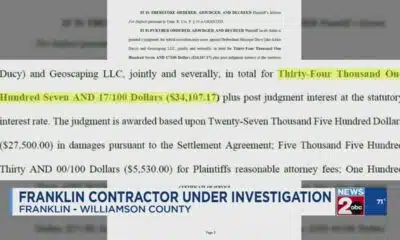News from the South - West Virginia News Feed
Morrisey: ‘Culture change’ coming for WV Department of Transportation after prior mismanagement
by Caity Coyne, West Virginia Watch
June 10, 2025
Gov. Patrick Morrisey on Monday announced an “overhaul” of the state’s Department of Transportation, saying years of financial mismanagement and outsized investment in new projects instead of maintaining existing infrastructure has left the agency broke.
The new “culture change” at DOT will include refocusing existing resources toward “long overdue” deferred maintenance of the state’s bridges and roads, reducing administrative overhead costs by cutting unspecified positions with “too high [of] salaries” and increasing transparency regarding details of the agency’s ongoing projects.
“We’re getting rid of the bureaucracy. We’re going to put more money in the roads and the bridges,” Morrisey said. “That’s what the people want. That’s what the people deserve.”
According to the Federal Highway Administration, as of 2024 West Virginia holds the second highest rate of bridges in the nation ranked in “poor” condition. Per an analysis of that data, more than 18% of the state’s bridges are in “poor” condition while 56% are considered to be “fair” and 25% are classified as being in “good” condition.
Between 2020 and 2023, West Virginia had the highest percentage of bridges in poor condition of any state. In 2024 — the most recent year with data on record — Iowa outpaced West Virginia with 19% of its bridges considered to be in poor condition.
Though he cited different data from unnamed sources, Morrisey said Monday he wants to see the state get its rate of bridges in poor condition below 10% by 2028.
Bridge conditions are determined federally by a formula analyzing different components of a bridge, including paving, cracks, structural performance, average usage and any reported damage. Bridges that score lower than four with the formula are considered “poor,” those between four and seven are “fair” and bridges scoring higher than a seven are in “good” condition, according to the U.S. Department of Transportation.
Todd Rumbaugh, the state’s transportation secretary, said the condition of the state’s bridges as well as its roads — of which at least one third are considered to be “deteriorated,” according to a report earlier this year — are only going to worsen in coming years.
That’s due to a lack of investment in maintenance, Rumbaugh said. As those needs increase, he continued, so do safety risks for everyone in the communities that rely on them.
“Deferred maintenance does not go away. It gets more expensive, it gets more dangerous over time,” Rumbaugh said. “That’s why we must shift the focus and resources towards preserving what we already have.”
Morrisey says Justice responsible for outsized debts on road infrastructure
In what has become a trend for Morrisey over his first six months in office, the new governor said several of the overarching challenges for the state’s transportation infrastructure were spurred by policy decisions he inherited.
Though he didn’t mention him by name, Morrisey’s speech Monday came with several not-so-subtle barbs against his predecessor, former Gov. Jim Justice.
Justice, who now represents the state as a Republican in the U.S. Senate, made West Virginia’s road infrastructure a core tenet during his eight years as governor. From 2017 to 2024, Justice started and oversaw the “Roads to Prosperity” project, which had billions of dollars put into road projects through increased registration fees, taxes and more to pay for general obligation bonds for the projects.
Morrisey said Monday, however, that he believes the money was largely misspent and didn’t account for the actual needs of existing infrastructure. It was so bad, he continued, that the federal government told his administration “very early on” that unless the state changed how it managed its highway system, there would be a cut to federal funds.
Federal funds are crucial for state road and bridge projects.
“Basically, the state was spending so much on some of the new highways without a clear plan for getting them done,” Morrisey said. “A basic look at our financial numbers made it obvious that we can’t even afford a lot of existing highways that were on the books.”
While the bonds purchased by the state for Roads to Prosperity were 30 year bonds, Morrisey said “every little bit” of those funds were allocated in the first seven years they existed.
When he took office in January, Morrisey said he was “alarmed” to learn that the Department of Transportation was “basically out of money.”
“I’m here to tell you that the Roads to Prosperity money — it’s all gone. It’s done. It’s not available into the future because it’s effectively committed,” Morrisey said.
And while the money is gone, debt for those bonds is hanging over the state while numerous projects remain incomplete and other needs are growing. Morrisey said that the state’s highway system is “responsible for $909 in highway debt for every person in the state of West Virginia.” Most other states, he continued, have transportation debts between $500-$600 per a person.
Now, he said, West Virginia will focus on a more “data-driven” approach that balances investments with immediate need. While most of the state’s funds will be going toward much needed infrastructure maintenance and improvements, the state will start to look at partnerships — with localities as well as public private partnerships — to start new roads projects where necessary.
The changes, according to Morrisey, will be large but they represent what he sees as a reflection of his administration’s priorities, especially when compared to Justice’s.
“We’re just not going to let political decisions guide this anymore … Too many of our leaders in the past wanted to kick the can down the road. They want to settle future generations with so much debt,” Morrisey said. “I want to be clear: under our administration, we want to pay our bills on time and not just push them way off into the future to be inherited by a new governor.”
YOU MAKE OUR WORK POSSIBLE.
West Virginia Watch is part of States Newsroom, a nonprofit news network supported by grants and a coalition of donors as a 501c(3) public charity. West Virginia Watch maintains editorial independence. Contact Editor Leann Ray for questions: info@westvirginiawatch.com.
The post Morrisey: ‘Culture change’ coming for WV Department of Transportation after prior mismanagement appeared first on westvirginiawatch.com
Note: The following A.I. based commentary is not part of the original article, reproduced above, but is offered in the hopes that it will promote greater media literacy and critical thinking, by making any potential bias more visible to the reader –Staff Editor.
Political Bias Rating: Center-Right
This article portrays Gov. Patrick Morrisey, a Republican, emphasizing fiscal responsibility and infrastructure maintenance over new projects, with critiques aimed at his predecessor’s approach to transportation funding. The content focuses on conservative-leaning themes such as reducing bureaucracy, limiting debt, and advocating for more transparent government spending. While it does not present overt partisan rhetoric, the perspective aligns more closely with center-right viewpoints favoring conservative fiscal policy and skepticism toward prior investments managed under potentially more expansive frameworks.
News from the South - West Virginia News Feed
Optum Rx invokes open meetings law to fight Kentucky counties on opioid suits
by Aneri Pattani, KFF Health News, West Virginia Watch
August 25, 2025
UnitedHealth Group’s multibillion-dollar pharmacy benefit manager, Optum Rx, is suing five Kentucky counties in an attempt to force them out of national opioid litigation against the company.
Pharmacy benefit managers, often called PBMs, act as middlemen that negotiate prescription drug prices between drug companies, insurance plans, and pharmacies. Some lawyers and advocates say PBMs helped fuel the overdose crisis by failing to restrict the flow of opioid prescriptions.
As governments begin exploring potential lawsuits against PBMs — a step that could represent the next wave in opioid-related litigation — Optum Rx is attempting to shut down those efforts, in some cases before they even fully take shape.
In June, Optum Rx sued Anderson, Boyd, Christian, Nicholas, and Oldham counties in Kentucky for allegedly making decisions about participating in the new wave of national opioid lawsuits behind closed doors, violating Kentucky’s open meetings law. Optum Rx is asking courts to effectively force those counties to make their decisions again, this time in open meetings, potentially with the hope that some won’t bother because of the administrative burden. The result could be fewer claims against the company and possibly less money for it to pay in a future settlement.
But legal experts call Optum’s case “hypertechnical” and “frivolous,” and addiction recovery advocates say it could set a dangerous precedent for companies to evade accountability for their role in fueling the overdose crisis.
Christine Minhee, an attorney, a national expert on opioid litigation, and founder of OpioidSettlementTracker.com, said Optum’s suit reminded her of an adage among lawyers: “If the facts are on your side, pound the facts. If the law is on your side, pound the law. If neither is on your side, pound the table.”
“Right now, what we’re seeing is it pounding the table,” Minhee said of Optum Rx. The company is “desperately” trying “to find some kind of foothold” to get cases against it thrown out.
Minhee said these suits fit a pattern of Optum Rx using thin arguments to try to delay or evade opioid litigation nationwide.
Last year, Optum Rx, along with another PBM, asked a judge to throw out an opioid lawsuit filed by Los Angeles County, claiming during a December hearing that the county hadn’t shown harm. The judge appeared skeptical of the claims and ultimately rejected the companies’ request.
In April, the same companies tried to oust a federal judge overseeing national opioid litigation, claiming he was biased. Their argument was based partly on a Florida lawyer’s having said the judge was “plaintiff-oriented.” Their attempt failed.
Now, Optum Rx is working to keep five Kentucky counties out of that same sweeping opioid litigation.
That national legal undertaking began more than seven years ago, as jurisdictions saw overdose deaths climb. Many people who had become addicted to prescription painkillers were cut off by their doctors, and some transitioned to using deadlier heroin or fentanyl. Health care and public safety costs skyrocketed. Thousands of cities, counties, and states began suing health care companies for allegedly creating a public nuisance by aggressively marketing prescription painkillers and negligently distributing them.
Those cases were lassoed together into the giant multidistrict litigation, which has resulted in massive settlements. The first few waves of settlements involved opioid manufacturers, distributors, and retail pharmacies, with companies such as Johnson & Johnson, CVS, and Walgreens agreeing to pay state and local governments billions of dollars. The money is meant to be used for addiction treatment and prevention services — though its rollout has been controversial.
To add a new round of companies as defendants, jurisdictions must undertake a multistep process, said Peter Mougey, a Florida-based attorney who represents many local governments in the massive national litigation. The five Kentucky counties in question were in the early stages of that process, only having asked the judge to amend their complaint, he said. They hadn’t added Optum Rx yet.
If Optum Rx’s suits are successful, those counties would have the option of redoing the initial steps of the process in a public meeting, then continuing to add Optum Rx as a defendant, Mougey explained. The company may hope that some counties won’t undertake the extra administrative effort.
Optum Rx’s “goal is clearly just to wear down and tire out these small counties,” Mougey said. “They’re trying to have a chilling effect on the litigation.”
It’s not clear why Optum Rx targeted those five counties out of the many localities undertaking the process to add the company as a defendant. The Kentucky counties range from having fewer than 8,000 residents (Nicholas) to more than 70,000 (Christian). One is among the richest in Kentucky (Oldham), while others are poorer. Boyd County, in Appalachia, is one of the hardest hit, with a recent overdose rate twice the state average.
Optum Rx, in its filing against Boyd County, which was similar to claims against the other counties, said local authorities had taken official legal action by asking the judge to make a change in its case. The suit said such action must be done in a public meeting and that the county did not hold one.
Optum spokesperson Isaac Sorensen told KFF Health News that the company’s argument is not about “a technicality.”
It is “an important legal requirement designed to ensure accountability and transparency before a county takes legal action,” said the statement Sorensen provided. “We have found many counties ignored this requirement, alongside their duty to preserve relevant evidence, and Optum Rx will defend against these improper legal actions.”
The five Kentucky counties disagree with these assertions, according to court records. As of late July, all five had filed motions to dismiss Optum Rx’s claim.
Boyd County, like the others, argued in its motion to dismiss that asking a judge to amend its complaint was a routine, procedural step that did not require a public meeting. Optum Rx jumped the gun, the county argued, filing a case before any final action had been taken.
“No amended complaint has been filed. No new defendant, OptumRx included, has been added. No new lawsuit has been initiated,” Boyd County’s response said.
The county also pointed out that it held an open meeting in 2017 that kicked off its involvement in the national litigation and authorized future amendments to that litigation.
Hearings on the counties’ motions to dismiss Optum Rx’s suits are set for late August and early September, according to court records.
These cases are shaping up to be a Goliath-versus-David legal action. Although Oldham County is the wealthiest of the Kentucky counties that Optum Rx sued, its most recent budget is less than 0.1% of Optum Rx’s annual revenue, which the company reported as exceeding $133 billion in 2024.
Oldham County Attorney D. Berry Baxter told KFF Health News he’d seen the impact of the opioid epidemic as a prosecutor working on a growing number of drug-related cases over the years. Now, as settlement money is arriving from other companies, it has funded increased addiction treatment in local jails. More settlement money from additional companies could expand such services, Baxter said.
If Optum Rx succeeds in kicking Kentucky counties out of the national litigation, it would set “a really horrific precedent” for other PBMs and health care companies to do something similar, said Tara Hyde, CEO of the statewide nonprofit People Advocating Recovery.
Hyde said she’s been in recovery for more than a decade from an addiction that began with prescription painkillers for a broken leg. She wants to see PBMs and other companies held accountable and made to change their processes to prevent future crises.
Despite a recent decrease in overdose deaths nationwide, Hyde said people in her state, their families, and the economy are still hurting.
“Recovery doesn’t just happen overnight,” she said. “Without these dollars that have been a direct result of people being misled, mistreated, and taken advantage of, we will still be detrimentally impacted.”
This article first appeared on KFF Health News and is republished here under a Creative Commons Attribution-NoDerivatives 4.0 International License.
West Virginia Watch is part of States Newsroom, a nonprofit news network supported by grants and a coalition of donors as a 501c(3) public charity. West Virginia Watch maintains editorial independence. Contact Editor Leann Ray for questions: info@westvirginiawatch.com.
The post Optum Rx invokes open meetings law to fight Kentucky counties on opioid suits appeared first on westvirginiawatch.com
Note: The following A.I. based commentary is not part of the original article, reproduced above, but is offered in the hopes that it will promote greater media literacy and critical thinking, by making any potential bias more visible to the reader –Staff Editor.
Political Bias Rating: Center-Left
This content leans center-left as it emphasizes corporate accountability, particularly targeting large healthcare companies and pharmacy benefit managers for their role in the opioid crisis. It highlights the struggles of affected communities and advocates for transparency and justice through legal action. The article supports regulatory and legal interventions to address public health issues, reflecting a perspective that favors government and community efforts to hold powerful entities responsible, which is characteristic of center-left viewpoints.
News from the South - West Virginia News Feed
Rock Hill rolling into 2025 with hunger to win
SUMMARY: Rock Hill High School, led by head coach Tony Love in his 32nd year, is gearing up for the 2025 football season with determination to win. After hosting a playoff game last year and advancing two rounds, the team is older, stronger, and hungrier. Emphasizing hard work, discipline, and mental toughness, the players have trained rigorously through winter. The offensive and defensive lines are crucial, handling the tough, physical battles on the field. This young but battle-tested squad is ready to start their season opener on the road, aiming to build on last year’s postseason experience and achieve greater success.
Football season is here and Rock Hill is ready to rock-and-roll on the gridiron. This team hosted a playoff game last year and was …
News from the South - West Virginia News Feed
WEEKEND WEATHER AUG 24TH
SUMMARY: WEEKEND WEATHER AUG 24TH: Today was a pleasant, typical summer day with temperatures reaching 80° in Beckley. A cold front is moving through tonight, bringing increasingly breezy winds and cooler air, dropping temps to the high 50s overnight and into the 40s early next week. Rain chances remain very low, with mainly dry conditions expected tonight and tomorrow. Monday will feature a mix of clouds and sun with highs in the high 60s to low 70s—cooler than normal. Low humidity and comfortable weather will continue through the week, making it a great time to enjoy the outdoors as fall arrives early.
FOLLOW US ON FACEBOOK AND TWITTER:
https://facebook.com/WOAYNewsWatch
https://twitter.com/WOAYNewsWatch
-
News from the South - Alabama News Feed7 days ago
U.S. agriculture secretary announces end to subsidies for solar panels on farmland
-
News from the South - Kentucky News Feed6 days ago
First of its kind clinical trial offers new hope for Kentuckians at risk of dementia
-
Our Mississippi Home6 days ago
MSU Unveils Mixed-Use Development Featuring Boutique Hotel, Cultural Landmark
-
News from the South - Georgia News Feed7 days ago
Don't eat this shrimp sold at Walmart due to possible radiation contamination: FDA
-
News from the South - Arkansas News Feed7 days ago
Cities across the US are embracing AI guidelines for local government workers
-
News from the South - Alabama News Feed6 days ago
Grants to boost local emergency alert systems in question as public media agency closes
-
News from the South - Arkansas News Feed6 days ago
‘Alligator Alcatraz’ probed by Dems as ICE detention centers multiply in states
-
News from the South - Texas News Feed7 days ago
The Innocent and the Executed: James Beathard’s Long-Forgotten Story












































